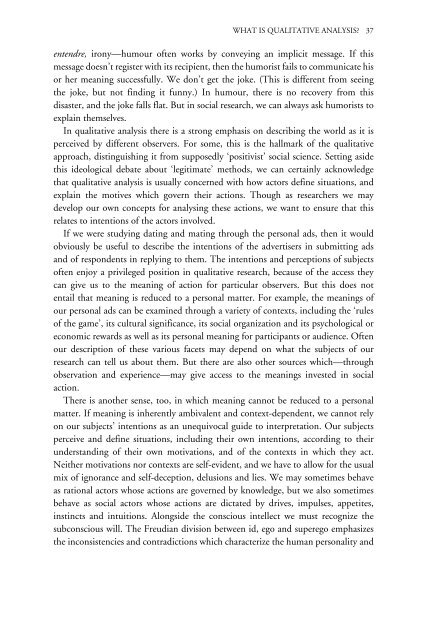Qualitative_data_analysis
Qualitative_data_analysis
Qualitative_data_analysis
Create successful ePaper yourself
Turn your PDF publications into a flip-book with our unique Google optimized e-Paper software.
WHAT IS QUALITATIVE ANALYSIS? 37<br />
entendre, irony—humour often works by conveying an implicit message. If this<br />
message doesn’t register with its recipient, then the humorist fails to communicate his<br />
or her meaning successfully. We don’t get the joke. (This is different from seeing<br />
the joke, but not finding it funny.) In humour, there is no recovery from this<br />
disaster, and the joke falls flat. But in social research, we can always ask humorists to<br />
explain themselves.<br />
In qualitative <strong>analysis</strong> there is a strong emphasis on describing the world as it is<br />
perceived by different observers. For some, this is the hallmark of the qualitative<br />
approach, distinguishing it from supposedly ‘positivist’ social science. Setting aside<br />
this ideological debate about ‘legitimate’ methods, we can certainly acknowledge<br />
that qualitative <strong>analysis</strong> is usually concerned with how actors define situations, and<br />
explain the motives which govern their actions. Though as researchers we may<br />
develop our own concepts for analysing these actions, we want to ensure that this<br />
relates to intentions of the actors involved.<br />
If we were studying dating and mating through the personal ads, then it would<br />
obviously be useful to describe the intentions of the advertisers in submitting ads<br />
and of respondents in replying to them. The intentions and perceptions of subjects<br />
often enjoy a privileged position in qualitative research, because of the access they<br />
can give us to the meaning of action for particular observers. But this does not<br />
entail that meaning is reduced to a personal matter. For example, the meanings of<br />
our personal ads can be examined through a variety of contexts, including the ‘rules<br />
of the game’, its cultural significance, its social organization and its psychological or<br />
economic rewards as well as its personal meaning for participants or audience. Often<br />
our description of these various facets may depend on what the subjects of our<br />
research can tell us about them. But there are also other sources which—through<br />
observation and experience—may give access to the meanings invested in social<br />
action.<br />
There is another sense, too, in which meaning cannot be reduced to a personal<br />
matter. If meaning is inherently ambivalent and context-dependent, we cannot rely<br />
on our subjects’ intentions as an unequivocal guide to interpretation. Our subjects<br />
perceive and define situations, including their own intentions, according to their<br />
understanding of their own motivations, and of the contexts in which they act.<br />
Neither motivations nor contexts are self-evident, and we have to allow for the usual<br />
mix of ignorance and self-deception, delusions and lies. We may sometimes behave<br />
as rational actors whose actions are governed by knowledge, but we also sometimes<br />
behave as social actors whose actions are dictated by drives, impulses, appetites,<br />
instincts and intuitions. Alongside the conscious intellect we must recognize the<br />
subconscious will. The Freudian division between id, ego and superego emphasizes<br />
the inconsistencies and contradictions which characterize the human personality and



